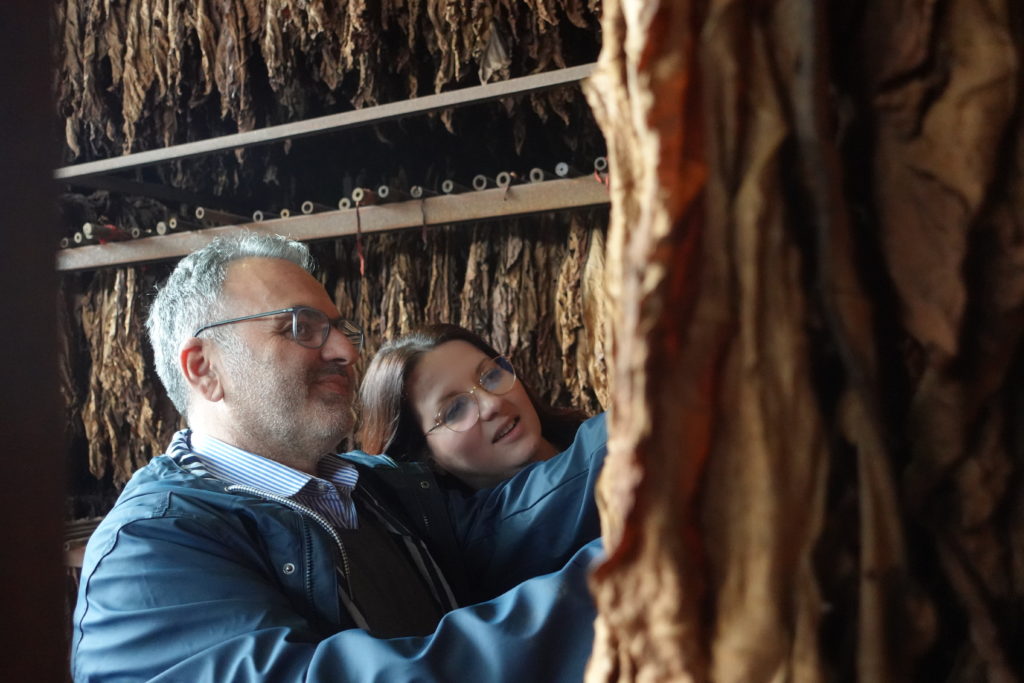Leggi la versione italiana
One cigar lady out of every hundred smokers is not enough to say that the cigar is a purely male object. Because behind the scenes there is a different story: that of the “tabacchine” and “cigar ladies”, those that produce “hand – made cigars”. Telling us about it is Gabriele Zippilli, star of CNA Storie of May and owner of the Tuscan Cigar Company. That of the famous Mastro Tornabuoni. A reminder of the craftsmanship of artisans and a tribute to Cardinal Nicolò Tornabuoni, Medici ambassador to the French Court. It was he, in 1574, who sent his uncle the bishop of Sansepolcro the tobacco seeds later donated to Cosimo I de’ Medici, who spread cultivation in the Grand Duchy. Gabriele is an avid cigar smoker, so much so that he built his own factory that produces two million pieces a year, as he jokes.
The brand of the short, sustainable and fair trade supply chain
Here the cycle opens and closes: tobacco grown using environmentally sustainable methods, harvested by hand, cured with oak wood from the surrounding forests, is sorted by the expert tabacchine into the various grades of wrapper and fillers, and then stored while waiting to continue the journey that will transform the leaves into fine traditional cigars. The entire process is powered entirely by renewable energy: “We make extensive use of renewable energy, we have 200 kW on the roof that gives us all the energy available, in fact, we put a large part of it on the grid,” Gabriele explains. We use local wood for agricultural care and wood chips and biomass for heating. We have a company that has the smallest thinkable carbon footprint. Right down to the cellophane that is compostable.”
Taking the path of sustainability is one of many, and important, choices pursued by Gabriele with his wife Michela. Always behind the scenes, yet always by his side. For both of them, the company is one big family, which recently opened its doors to Tediana, who fled Ukraine. Two children and a husband left fighting in Ukraine. “We hired her a few months ago, and she has paid us back exceptionally well by working with such dedication and conscientiousness for the company,” she says.
“Kentucky tobacco” and the territory straddling Tuscany and Umbria
We are in the Upper Tiber Valley, straddling Tuscany and Umbria. This is the Italian territory where “Kentucky tobacco “was first imported. This is where the story of the emancipation of the tabacchine started: they are the ones in charge of selecting the leaves, dried on the poles, and ready to pass into the expert hands of the cigar makers, who are entrusted with the subsequent processing. The cigar is the synthesis of “a centuries-old tradition handed down orally, encapsulated in an artifact making it very special. And this concept is highly appreciated by the market because we have a fairly important continuous growth.” The Mastro Tornabuoni can be found in a double version: just over half of the production is entirely handmade. The rest, by machine.
A highly crafted, highly sought-after product. Two million a year is not enough to meet a growing demand, even beyond national borders. But more than a limitation, this is a choice. As in: it is not the Tuscan Cigar Company that chases the market, it is rather the market that chases the Tornabuoni. “Being a really short supply chain, we have to start from a production that has to be increased, from the workforce that we keep training and equipment that we keep buying.” A slow process, as long are the cigars’ curing times. “And so,” Gabriele notes, “we fortunately have some difficulty in following the market.
It is not the Tuscan Cigar Company that chases the market, it is rather the market that chases the Tornabuoni
The craftsmanship is all in the hands of women: “The cigar maker is a woman because she is more careful; she has greater manual accuracy and manual skill, she has greater consistency in production; she has something more than the man who maybe can also make a good product however, he cannot be constant in production. Even the tabacchine, engaged in that pre-manufacturing phase, are almost all women. Two beautiful stories of women’s emancipation in this area because the tabacchine were the first to bring money into the family in a rural society that lived mainly on barter,” Gabriele says.
The tabacchine were the first to bring money into the family in a rural society that lived mainly on bartering
The market can wait, because the business works, and that’s okay. The pillars are manual skills and training. Apprenticeship does not exist: here you just hire. And you learn from the expert hands of the two master cigar makers, retired, whom we were not lucky enough to cross paths with. But their presence is felt in the attention and care of these young women. Each piece that passes through their hands is a blend of earth, craftsmanship and tradition.
